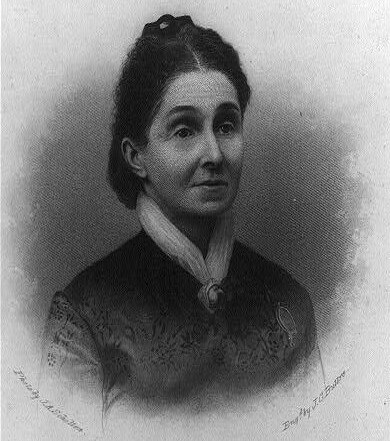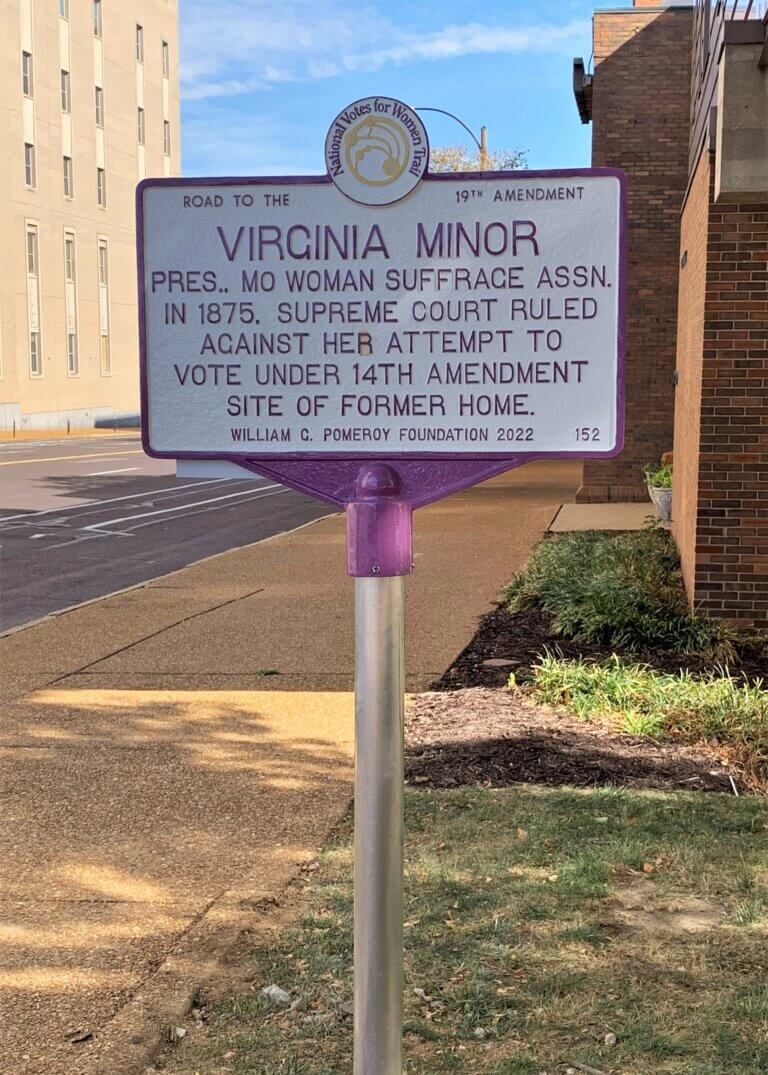VIRGINIA MINOR
- Program
- Subject
- Location
- Lat/Long
- Grant Recipient
-
National Votes for Women Trail
-
People, Site
- 2652 Olive Street, St. Louis, MO, USA
- 38.6333714, -90.2162719
-
National Collaborative for Women's History Sites
VIRGINIA MINOR
Inscription
VIRGINIA MINORPRES., MO WOMAN SUFFRAGE ASSN.
IN 1875, SUPREME COURT RULED
AGAINST HER ATTEMPT TO
VOTE UNDER 14TH AMENDMENT.
SITE OF FORMER HOME.
WILLIAM G. POMEROY FOUNDATION 2022
Virginia Minor was an early leader in the women’s suffrage movement and was the 1867 founding president of the Woman Suffrage Association of Missouri. In 1867 and 1868, Missouri suffragists petitioned the Missouri Legislature to amend the state constitution in attempts to secure women’s right to vote. A copy of the 1868 petition to the state legislature was printed on the front page on the February 25, 1868 edition of the Daily Missouri Republican. The petition was signed by both men and women, including Minor, and requested that “an amendment to the Constitution may be proposed striking out the word ‘male’ and extending to women the right of suffrage.” The petition was defeated.
In 1872 Minor attempted to register to vote in St. Louis County, Missouri, contending that as a citizen of the U.S., the Fourteenth Amendment of the U.S. Constitution guaranteed her right to vote, and that by restricting suffrage to only male citizens, the Missouri state constitution was in violation of the Fourteenth Amendment. Having been recently ratified in 1868, the Fourteenth Amendment was intended to confer citizenship and equal legal and civil rights of newly freed African Americans after the American Civil War. It reads in part that “All persons born or naturalized in the United States and subject to the jurisdiction thereof, are citizens of the United States and of the State wherein they reside” and that “No State shall make or enforce any law which shall abridge the privileges or immunities of citizens of the United States.”
When she was not allowed to register to vote, Minor sued the registrar Reese Happersett, and the case went to the Missouri State Supreme Court, ultimately reaching the U.S. Supreme Court. In 1875, the U.S. Supreme Court ruled that:
Neither the Constitution nor the fourteenth amendment made all citizens voters … a provision in a State constitution which confines the right of voting to “male citizens of the United States,” is no violation of the Federal Constitution. In such a State women have no right to vote.
With this decision, the U.S. Supreme Court had declared that citizenship did not automatically guarantee the right to vote. This led to a national shift in the women’s suffrage movement, with suffragists now focusing their efforts on individual state constitutional amendments and ultimately a federal constitutional amendment that would secure women’s right to vote across the country.
Minor continued to fight for women’s suffrage for the rest of her life, serving as president of the Woman Suffrage Association of Missouri for many years. At the time of her death in 1894, she was serving as vice president of the state association.
From at least 1877 to 1882, Minor resided at 2652 Olive Street in St. Louis, Missouri, where she was host to women’s suffrage meetings and national suffrage leaders, including Susan B. Anthony. A National Votes for Women Trail marker at the site of Minor’s former Olive Street home recognizes her significant contribution to the women’s suffrage movement.


